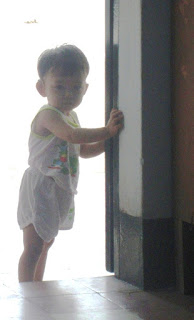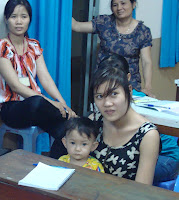Our Parent Program has run every night over the course of this past month in Vietnam, splitting between group lectures and individual family consultations. Families have come 30-40 strong to learn strategies and activities they can do at home to foster auditory and spoken language development in their children. The individual consultations take place between one family and members of the Global Foundation’s audiology and education team and are designed to answer specific questions about their own children.
The questions posed by the families — and even the professional participants in our program — reflect a reality that while much progress has been made, there are still deep gaps in the system of support for children with hearing loss in Vietnam. For every two steps forward, it seems there has been one step backwards.
 And so yesterday when this little guy in the photo here showed up with his mother and aunt from a far-away province to join our Parent Program, I could not help but wonder about his future.
And so yesterday when this little guy in the photo here showed up with his mother and aunt from a far-away province to join our Parent Program, I could not help but wonder about his future.
He is 15 months old and has a profound hearing loss. He was identified at a relatively early age and wears two hearing aids. However,early intervention services are not available where he lives. There are no resources or support to help him and his family navigate hearing loss. I was so glad that the family traveled all this way to spend time with us this week and learn what they could do to help their son. And yet I know so much more needs to be done.
There are four key elements that need to be in place for a child who is deaf or hard of hearing to learn to listen and talk: early identification of hearing loss, access to appropriate hearing technology, the support of trained professionals, and an engaged family. All children develop language in the first years of life, and the first 3 are the most critical. A child must hear sound during this window of time to effectively progress through the natural development of learning to hear and then to listen and then to talk. The longer a child goes without access to sound, the more difficult it is for the child to overcome hearing loss and “catch up” with hearing peers in speech, language, and cognitive development.
 Access to hearing aids is still an issue in some areas inVietnam, particularly in the rural and poor communities. Families must pay for hearing aids and cochlear implants entirely out of their own pockets. Schools sometimes loan hearing aids to children in low income families, but those are not usually adjusted to fit a specific child’s needs. What’s more, children with these loaner hearing aids do not wear them outside the school hours, hindering their progress. Cochlear implants are financially out of reach for most families. There are too few early intervention programs and trained professionals. Lack of resources and equipment leave hospital staff no choice but to focus hearing screening efforts on “high risk” children, leaving hundreds more babies and young children with unidentified hearing loss that likely will lead to developmental delays.
Access to hearing aids is still an issue in some areas inVietnam, particularly in the rural and poor communities. Families must pay for hearing aids and cochlear implants entirely out of their own pockets. Schools sometimes loan hearing aids to children in low income families, but those are not usually adjusted to fit a specific child’s needs. What’s more, children with these loaner hearing aids do not wear them outside the school hours, hindering their progress. Cochlear implants are financially out of reach for most families. There are too few early intervention programs and trained professionals. Lack of resources and equipment leave hospital staff no choice but to focus hearing screening efforts on “high risk” children, leaving hundreds more babies and young children with unidentified hearing loss that likely will lead to developmental delays. The many challenges have not discouraged me but rather has strengthened my purpose to continue to help improve the education and life opportunities for children who are deaf or hard of hearing in Vietnam. We are on the right track. Our Vietnam Deaf Education Program has already directly helped many Vietnamese families and professionals. Our team has done an amazing job increasing awareness and spurring change, and we will continue to do so.
Over the course of the past three years, we have developed strong working relationships with Vietnamese partners in the deaf education and healthcare communities and with policy makers and other nongovernmental organizations. Together, we are looking at the system of support and working to strengthen the weak areas and fill the gaps. With the collaborative team that we have here in Vietnam, I know we will be successful. I’m looking to the future and a time when toddlers like this one who brightened our parent program this week with his presence will have the support they need and every chance for success in life in spite of a hearing loss.
Jacqueline Novagratz once said “Aim to be a leader who is not simply looking for a roadmap to follow, but is willing to challenge the status quo, to understand the world as it is, yet have the audacity and moral courage to build the world that could be.”
Fitting words for all of us here in this time and place.